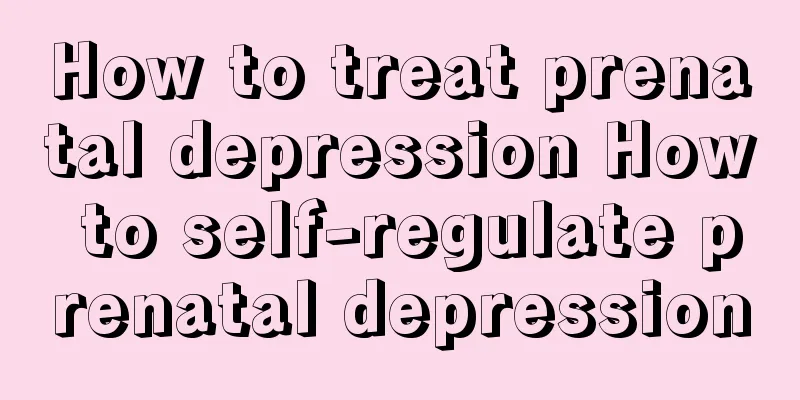How to treat prenatal depression How to self-regulate prenatal depression

|
Prenatal depression is a disease with a low probability, but pregnant women suffering from depression are very harmful to themselves and their unborn babies. Therefore, we must learn to self-regulate after suffering from depression. So how can we guide prenatal depression? How can we self-regulate prenatal depression? How to treat prenatal depressionMild prenatal depression can be adjusted through relaxation training, emotional counseling, cognitive therapy, etc. You can actively participate in pregnant women's classes in professional schools to learn about pregnancy, childbirth, postpartum recovery, parenting, etc., and reduce anxiety and depression by improving your understanding. Expand social interactions, communicate more with your husband, parents, and friends, talk about negative emotions, seek support from your family, and get more care. When the symptoms of prenatal depression are severe, the care of the parturient should be strengthened to prevent accidents such as self-injury and suicide. Physical therapy can be performed, such as repeated transcranial magnetic stimulation. Try not to take antidepressants in the first 3 months of pregnancy. In the middle and late stages of pregnancy, appropriate drug treatment can be used under the guidance of a psychiatrist. Mild prenatal depression can be adjusted through relaxation training, emotional release, cognitive therapy, etc. You can actively participate in pregnant women's classes in professional institutions to learn about pregnancy, childbirth, postpartum recovery, parenting, etc., and reduce anxiety and depression by increasing your cognition. Expand your social circle, communicate more with your husband, parents, and friends, talk about negative emotions, seek support from your family, and get more care. For prenatal depression with particularly severe symptoms, it is necessary to strengthen the care of the mother to prevent accidents such as self-harm and suicide. You can try physical therapy such as repeated transcranial magnetic stimulation. Try not to use antidepressants in the first 3 months of pregnancy. In the middle and late stages of pregnancy, you can use appropriate medication under the guidance of a psychiatrist. How to self-regulate prenatal depressionPrenatal depression can be regulated through the breath-watching method. First, choose a quiet environment. Pregnant women should sit cross-legged, hold their chests and heads high, and close their eyes. Focus on the breath in and out of the nostrils, and maintain an "equal mind", that is, do not judge, analyze, or think. A regular daily routine can enrich a person's heart and eliminate messy thoughts. This is especially important for women with prenatal depression. You can make a plan for your daily life, which should not be too complicated. After making a plan, you must stick to it, which can divert your negative focus and avoid wild thoughts. If you reduce social activities and isolate yourself, it is easy to cause depression to worsen, and then fall into a vicious circle. Therefore, patients should engage in more social activities, and need to force themselves to go out for a walk, chat with friends more, or do something they like. Usually, as long as they can persist for a period of time, the depression will be greatly improved. How to check for antenatal depressionPrenatal depression can be checked by observing the performance in life. Some pregnant women will feel that everything around them is not fun, and they will feel very tired all day long. It is difficult to concentrate on doing things. It is also easy to get angry with family members and become irritable. Many patients with prenatal depression also suffer from insomnia. Even if there is no anemia during the examination, sometimes you will feel that your body is always very tired. Sometimes you are also very resistant to food, or you can only get happiness by eating food. If these symptoms continue to appear for more than half a month, it is likely that their body is suffering from a mental illness. How to deal with prenatal depressionThere are many treatments for prenatal depression, including medication, physical therapy, and psychotherapy. However, for patients with prenatal depression, medication should be avoided as much as possible due to the side effects of medication. First of all, patients should be encouraged to actively learn about the process of labor and postpartum care, exchange experiences with other mothers, and relax. They should also be given adequate rest time to reduce concerns about other stressors in their family life. |
Recommend
Signs of successful frozen embryo transfer Precautions after frozen embryo transfer
Frozen embryo transfer is an important step in th...
What should pregnant women pay attention to when eating meat? How to eat meat healthily during pregnancy
There are many kinds of meat, and different meats...
How old is the right age for a baby to go to kindergarten? Is it good for a baby to go to kindergarten too early?
Babies can go to kindergarten when they are about...
Pregnancy check-up time and items When does pregnancy reaction usually start?
Usually, during pregnancy, mothers need to go to ...
What is the reason for the white spots on the newborn's neck? What should I do?
Babies always love to play, and their bodies alwa...
Can I wear the Kao steam eye mask overnight? Taboos of using the Kao steam eye mask
Sleep quality is something that more and more peo...
What is the reason for a one-month-old baby to spit bubbles?
The baby has been developing for more than one mo...
Can I take painkillers during childbirth? What can I eat to replenish my energy during childbirth?
Some women want to take painkillers to relieve th...
What are the symptoms of pregnant women a few days before delivery? What should they eat to make it easier to give birth?
Pregnant women are about to give birth in a few d...
Is it better for parturients to have a caesarean section or a natural birth? What should parturients pay attention to during a caesarean section?
For expectant mothers who are about to give birth...
Will the fetal heart rate be normal if the fetus is hypoxic? Will the fetus still hiccup if it is hypoxic?
Pregnant women always pay attention to the condit...
Does Yunnan Baiyao toothpaste contain fluoride? What are the benefits of Yunnan Baiyao toothpaste for teeth?
Yunnan Baiyao toothpaste is something we are all ...
Which country is Calcite from? Where is Calcite produced?
Many people's understanding of Calcium comes ...
Can pregnant women eat black olives? Who can't eat black olives?
Black olives are a type of olive, but they are di...
Can a humidifier purify the air? Can a humidifier heat water?
It is not recommended to place a humidifier at th...









